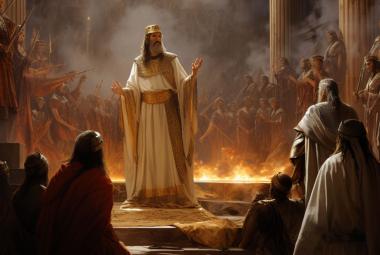Stephen’s presentation in Acts 7 emphasized a pattern of failure: that Israel repeatedly failed the first time, and then succeeded on their second. The Scriptures extensively portray a “God of the Second Chance.”
One of the essential preludes to victory is to learn from our failures. And the ultimate resource for victory in life is, of course, the record in the Word of God itself. The record of Israel—including its failures—is there for our learning.1
One of the most interesting chapters in the Bible is the critical assessment of Israel’s history, presented by a young deacon named Stephen and recorded in the seventh chapter of the Book of Acts. He aggressively brought his challenges before the most august body of the nation—the Sanhedrin itself—in what is one of the most remarkable passages in the Bible.
The main thrust of Stephen’s indictment highlighted the pattern of failures throughout Israel’s entire history: initial failures followed by subsequent repair.
Abraham was initially called out of the Ur of the Chaldees to leave his family and travel to a new land. But he waited 25 years until his father died before following God’s instructions.2
(In fact, from the subtleties of the text in Acts 7 we discover a number of things that elude the usual readings in the Old Testament: the fact that the Pharaoh of the Exodus was not an Egyptian,3 etc.)
Stephen’s presentation emphasized a pattern of failure: that Israel repeatedly failed the first time, and then succeeded on their second. Joseph was sold into slavery by his brothers, rose to become the prime minister of the world, and yet Stephen notes that it was on their second visit that they recognized who he was.4 Even Moses’ leadership was initially rejected the first time,5 and then accepted the second time.6
This pattern of failures was also their repeated experience throughout the entire Book of Judges: initial apostasy and rebellion, then subsequent repentance and restoration. Again, and again, and again.
If you extract an outline of Stephen’s message you find a cascaded pattern of failures toward a climax:
Which of the prophets have your fathers not persecuted? and they have slain them which showed before of the coming of the Just One; of whom ye have now been the betrayers and murderers.
And you can anticipate his apparent intended conclusion. But he was interrupted and then stoned. His martyrdom interrupted the impending implied prediction: that they will accept the “Just One” at His second subsequent appearance!
This critique of Israel is from the Word of God and was also underscored by the Lord Himself.7 During His “Triumphal Entry,” His entrance to Jerusalem presenting Himself as King, He wept:
And when he was come near, he beheld the city, and wept over it, Saying, If thou hadst known, even thou, at least in this thy day, the things which belong unto thy peace! but now they are hid from thine eyes.
This was the very day that Gabriel had precisely predicted to Daniel five centuries earlier.8 Therefore He then pronounced national blindness as a result of their failure to recognize the significance of “this thy day.”
(This blindness is not permanent:9 their ultimate repair will result from a forthcoming trial.10)
Jesus also predicted the impending fall of Jerusalem:
For the days shall come upon thee, that thine enemies shall cast a trench about thee, and compass thee round, and keep thee in on every side, And shall lay thee even with the ground, and thy children within thee; and they shall not leave in thee one stone upon another…
Subsequently, 38 years later, the Roman legions would lay siege to the city, slaughtering over a million men, women and children, in a disaster that is mourned to this day. (The reason glass goblets are crushed at a Jewish wedding is in commemoration of this very tragedy.)
Why did Jerusalem fall in 70 a.d.? There are several justifiable responses to that question; however, the Lord’s own explanation is chilling:
…because thou knewest not the time of thy visitation.
The Lord held them accountable for knowing Daniel’s prophecy. There are several sobering implications which emerge from that revelation.
The Predicament of America
As we survey our own predicament in America, it is easy to become alarmed. The widespread corruption is evident throughout our land, in all the corridors of power—in Wall Street as well as in Washington.
Our government has abandoned the Constitution; our Congress signs bills they don’t bother to read; our schools deliberately dumb down our youth; our media takes pride in shaping opinions rather than informing the electorate; our entertainment industry celebrates every form of sin and debauchery it can devise; and, we attempt to outlaw God out of all public places as we abandon the heritage which gave us the liberties and abundance we’ve come to take for granted.
And, where’s the outrage? The apathy and silence is astonishing! Some would argue that God’s “Abandonment Wrath” has already begun. Yet, it still may not be too late…
God of the Second Chance
The Scriptures extensively portray a “God of the Second Chance.” God always allows for repentance. God has declared a clear and exciting promise:11
If my people, who are called by my name, shall humble themselves, and pray, and seek my face, and turn from their wicked ways; then will I hear from heaven, and will forgive their sin, and will heal their land.
Notice that this is not addressed to our President, our Congress, those in the corridors of power, or our population in general: It is addressed to “My people, who are called by my name.” It is, thus, I trust, addressed to you and me.
If we will humble ourselves, and pray, and seek His face, and turn from our wicked ways—then He will forgive our sin and heal our land.
We desperately need a national revival—but it must begin with you and me. It is our sin that is standing in the way of what God would prefer to do: to have America continue as a beachhead for the Gospel to a hurting world.
Our destiny as a nation will not be decided in the ballot boxes. It will devolve from our prayer closets.
The Prodigal Heirs
Both Israel and the Church have had their failures. While each have had distinct origins and will have distinct destinies, we need to learn from both. The failures of the Church are also dealt with in the Seven Report Cards presented by the Lord Himself in Revelation 2 and 3. These two chapters, in that most blessed of books, are the most relevant to each of us. It should be our prayer that all of these lessons not be wasted. (There is a prevalent heresy that “the Church has replaced Israel.” However, it soon will be the other way around: Israel will replace the Church, after the Harpazo! Think about it.)
Notes:
- Romans 15:4.
- Acts 7:1-4. Abraham simply moved up river to Haran until his father died.
- The use of heteros rather than allos indicates “another” of a different kind. Isaiah 52:4 indicates he was an Assyrian.
- Acts 7:13.
- Acts 7:25-28.
- Acts 7:35, 36.
- Matthew 23:37-39.
- Daniel 9:25. (The fabled “70 Weeks” of Daniel 24-27.)
- Romans 11:25 (until the “fullness of the Gentiles come in.” Where?).
- Hosea 5:15 (the ostensible purpose of the “Great Tribulation.”).
- Denotatively, this passage refers to Israel. Connotatively, it is a principle declared by an immutable God, “who changes not.”







